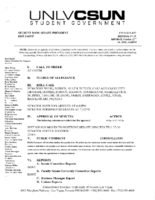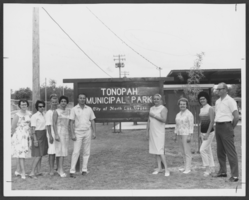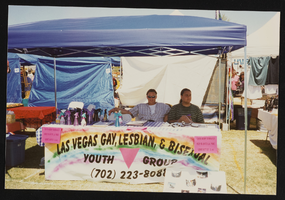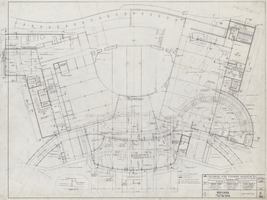Search the Special Collections and Archives Portal
Search Results

Meeting minutes for Consolidated Student Senate, University of Nevada, Las Vegas, October 22, 2007
Date
Archival Collection
Description
Text
Patricia and Robert Schnider oral history interview
Identifier
Abstract
Oral history interview with Patricia and Robert Schnider conducted by Claytee D. White on October 22, 2018 for the Boyer Early Las Vegas Oral History Project. In this interview, Robert discusses his early life and arriving to Las Vegas, Nevada in 1955. He remembers attending Nevada Southern University (now University of Nevada, Las Vegas) and his father's ownership of the Capri Motel. Patricia discusses her upbringing in Las Vegas, and growing up homesteading. Lastly, Patricia and Robert describe entertainment in Las Vegas during the late 1950s.
Archival Collection

Photograph of North Las Vegas Women's Club, North Las Vegas, July 22, 1965
Date
Archival Collection
Description
Image
Gerald L. Connor oral history interview
Identifier
Abstract
Oral history interview with Gerald Connor conducted by James Bonnell on February 22, 1977 for the Ralph Roske Oral History Project on Early Las Vegas. Connor first discusses moving to Las Vegas, Nevada and serving as a pilot in the United States Air Force. He then discusses his education at the University of Nevada, Las Vegas and his church membership. Topics that Connor discusses during the interview also include changes in the school district and properties located in Downtown Las Vegas and the Las Vegas Strip, his political activity within the Democratic Party, the Helldorado Parades, and the early atomic tests at the Nevada Test Site.
Archival Collection
Oral history project files: correspondence, photographs, publicity, and transcript drafts, 1995-2015
Level of Description
Archival Collection
Collection Name: Women's Research Institute of Nevada (WRIN) Oral History Records
Box/Folder: Box 01 (Restrictions apply), Box 02 (Restrictions apply), Box 03 (Restrictions apply)
Archival Component
Amilcar "Ace" Daniels oral history interviews
Identifier
Abstract
Oral history interviews with Amilcar “Ace” Daniels conducted by Rodrigo Vazquez and Monserrath Hernández on June 15, 2019 and June 22, 2019 for the Latinx Voices of Southern Nevada Oral History Project. In the first interview, Daniels discusses growing up in Las Vegas, Nevada and shares his parents' emigration story from the Dominican Republic to the United States in the early 1980s. He talks about attending the College of Southern Nevada (CSN), the University of Nevada, Reno (UNR), and the University of Nevada, Las Vegas (UNLV). Later, Daniels speaks on his career in hospitality, his passion for live theater, and his advocacy for the performing arts in Las Vegas. He talks about being a minority person in the hospitality industry, the importance of maintaining his cultural identity, and Latino representation in theater. In the second interview, Daniels discusses his involvement with the non-profit arts organization Super Summer Theatre, and participating in the Las Vegas Pride Festival. Lastly, Daniels talks about issues of colorism in the Latinx community.
Archival Collection

Las Vegas Gay, Lesbian, and Bisexual Youth Group booth at Gay Pride: photographic print
Date
Archival Collection
Description
Image
Las Vegas LGBTQ Archive at the Sunset Park Gay Pride festival: photographic print, 1997 May 10
Level of Description
Archival Collection
Collection Name: Dennis McBride Photograph Collection
Box/Folder: Box 042
Archival Component

Architectural drawing of the Hacienda (Las Vegas), first floor plan, May 22, 1963
Date
Archival Collection
Description
Plans for hotel room and public area additions for the Hacienda from 1963-1965. Includes detail of new ceiling measurements. J. L. Cusick and Associates, electrical engineers; Harold L. Epstein and Associates, structural engineers; W. L. Donley and Associates, mechanical engineers.
Site Name: Hacienda
Address: 3590 Las Vegas Boulevard South
Image
Claytee D. White oral history interview
Identifier
Abstract
Oral history interview with Claytee D. White conducted by Stefani Evans on November 2, 2023 for the African Americans in Las Vegas: a Collaborative Oral History Project. In this interview, Claytee D. White, founding directory of the Oral History Research Center at UNLV Libraries, celebrates the twentieth anniversary of the OHRC by contributing her oral history to the collection.
She begins by explaining how the system of sharecropping worked in her family near rural Ahoskie, North Carolina, and she talks about the field work involved in raising cotton, tobacco, corn, and peanuts. The fifth of eight children and the first daughter, she shares memories of going into town with her mother, of admiring her women teachers, and of attending North Carolina Central College (now University) for two years before moving to Washington, D.C., and working for the telephone company.
After recalling her two years in D.C. and 22 years in Los Angeles, California, she describes "running away" to Las Vegas, Nevada in the early 1990s. Here, at the History department at UNLV, she recalls learning to conduct oral histories. White shares memories of her first interviews with Hazel and Jimmy Gay and Lucille Bryant. She talks of matriculating to the College of William and Mary for her PhD and of returning to Bertie County to live with her mother and administer the office of The Shaw University Center for Alternative Programs in Education (CAPE). She describes how she was offered the position of OHRC founding director, why it matters that she was an "opportunity hire," and how it feels to be the only Black person in a room.
Archival Collection
